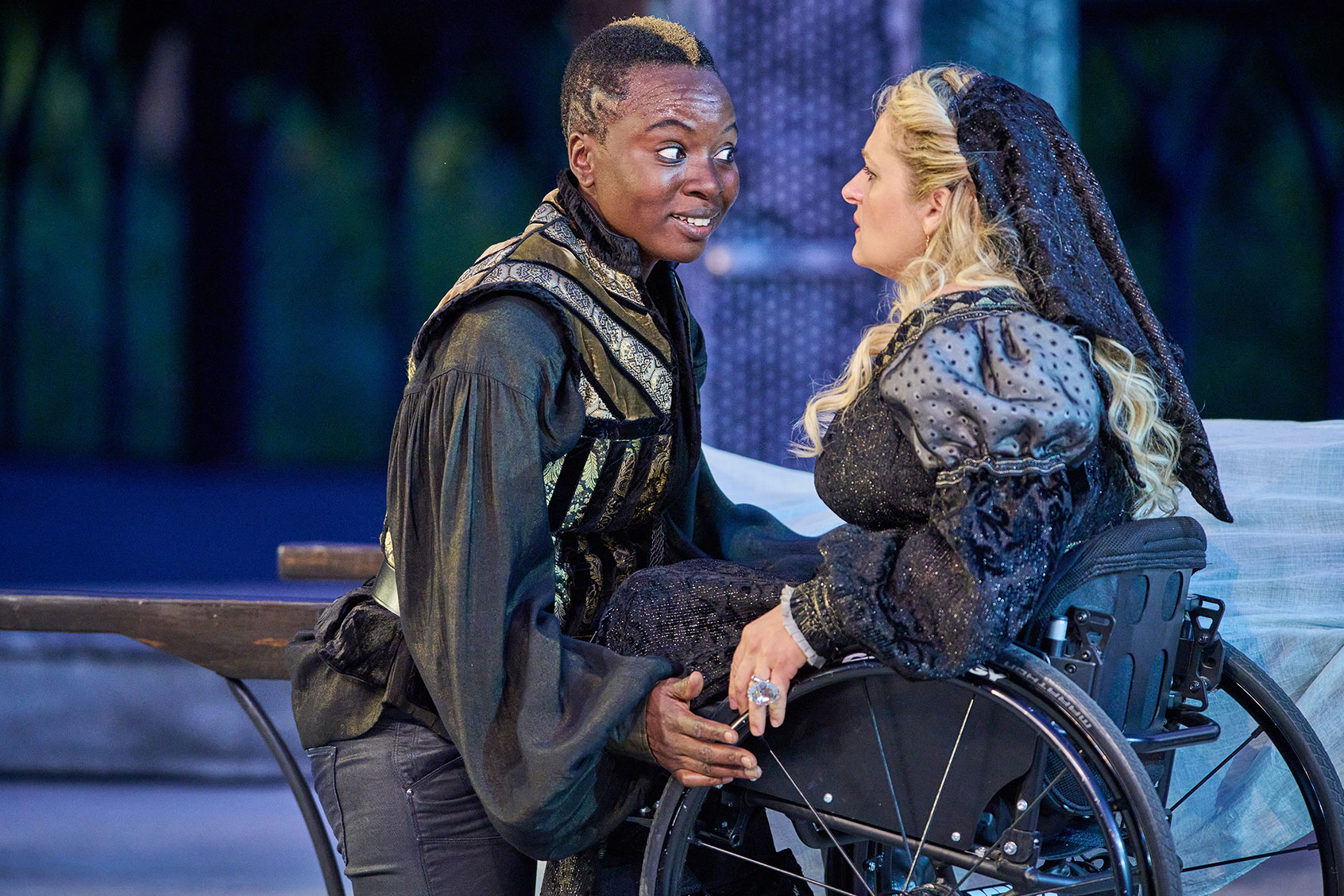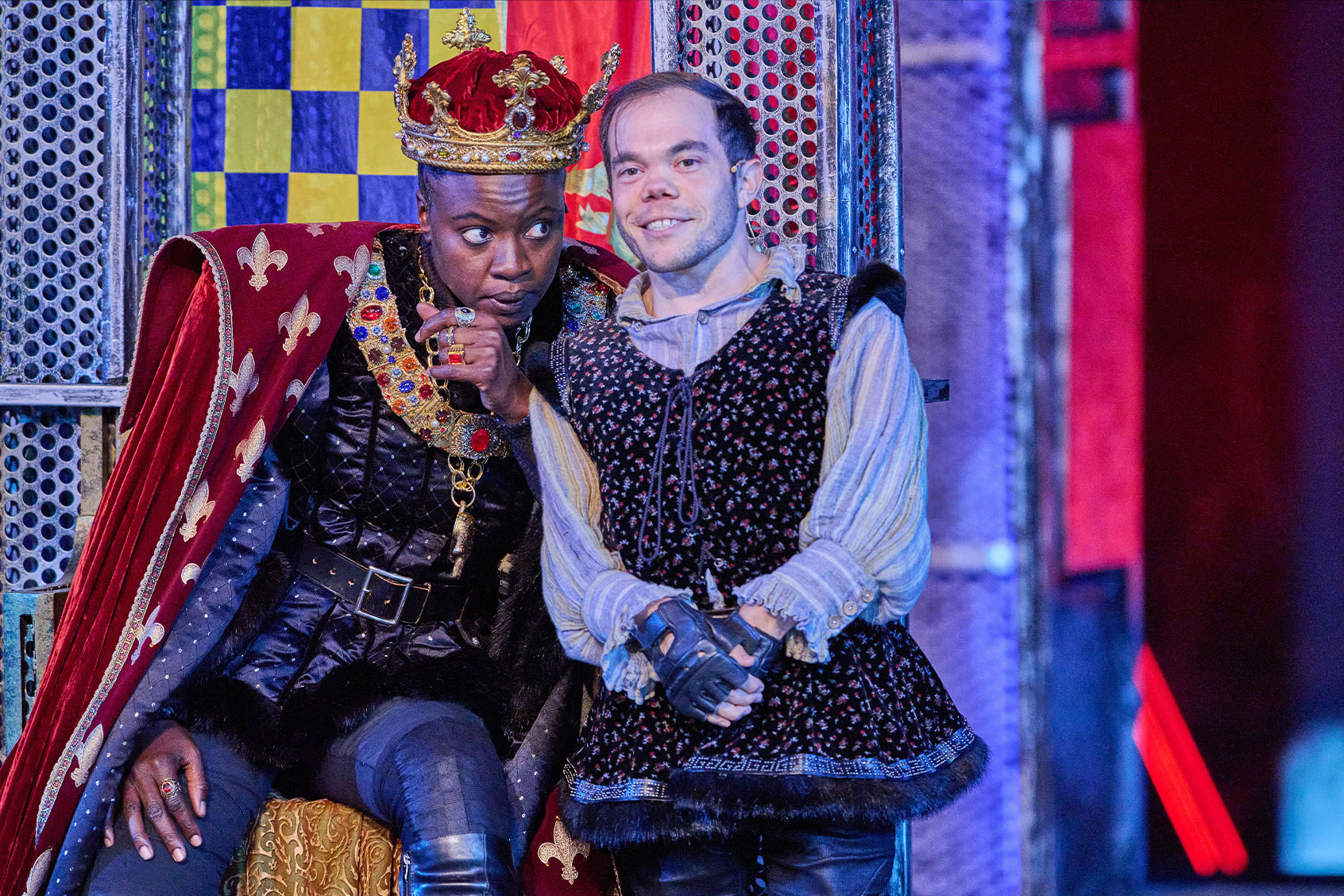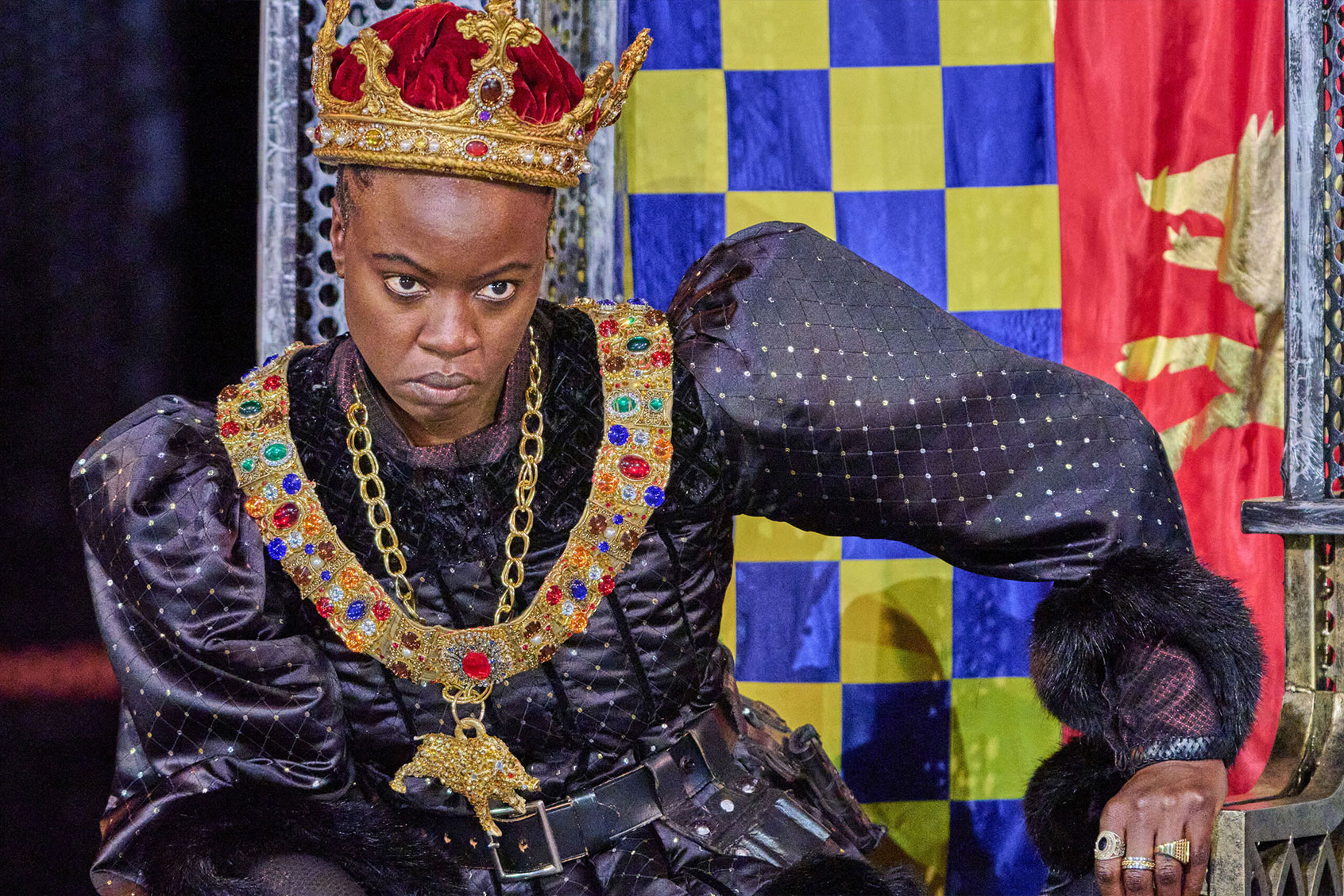Even if you have never seen a production of William Shakespeare‘s “Richard III” you know and probably adore some version of him. The Bard’s villain of villains echoes throughout entertainment, manifesting in the likes of Tony Soprano and Walter White – antiheroes positioned in their stories as heroes.
Director Robert O’Hara (“Slave Play”) additionally blurs the definition of protagonist and antagonist by casting actor and playwright Danai Gurira in the title role, a woman who embodies two of the fiercest heroes on TV and in film. In the Marvel Cinematic Universe, she’s revered as Okoye, the fierce general of the Dora Milaje in the “Black Panther” series. She’s played Michonne in “The Walking Dead” for more than a decade.
Taking on “Richard III” returns Gurira to familiar ground as a performer steeped in the literary and performance traditions of Shakespeare and as a playwright who understands, as she observed at a press conference a few months ago, that great writing “transcends culture, it transcends the specificity of the color of your skin or even gender. It transcends those things. It’s about the human experience.”
O’Hara’s production of “Richard III,” staged in New York as part of the Public Theater’s 2022 Shakespeare in the Park series, adds new dimensions to his text by adopting a tonal vernacular modern audiences can understand while maintaining the text’s integrity.
In casting Gurira, who he directed in a 2005 production of “In the Continuum,” a play that she wrote, O’Hara adds to a list of expansive interpretations of Shakespeare that transcend theater’s longstanding practice of excluding performers who aren’t white, mainly male and able-bodied to inhabit central roles.
 Danai Gurira and Ali Stroker in “Great Performances: Richard III” (Courtesy of Joe Sinnott)
Danai Gurira and Ali Stroker in “Great Performances: Richard III” (Courtesy of Joe Sinnott)
Joining Gurira in this production are Ali Stroker as Anne, Monique Holt, one of several deaf performers, as Richard’s mother, the Duchess of York, and Gregg Mozgala in a dual role as Richard’s brother Edward and Richmond, who eventually claims the crown as King Henry VII.
Their performances match Gurira’s in force and stamina, and add new layers to Shakespeare’s texts and the director’s staging. Anne, who despises Richard, is made physically faster by the fact that Stroker uses a wheelchair and easily outpaces Gurira on the stage.
In casting a Black woman in the role Shakespeare envisions as a hunchback, O’Hara conveys the character’s outsider nature by having two white men portray her brothers. In a separate conversation with Salon, Gurira says she found that depicting that side of Richard to be less challenging than simply inhabiting the psychology of someone immortalized for centuries as a figure “determined to prove a villain.”
This interview has been edited for length and clarity.
Richard III is a very muscular role that requires athleticism, along with a high level of memorization and of course, through the direction, care in crafting what aspects of the dialogue you choose to emphasize. You were coming directly off the production for “Wakanda Forever” into this performance, correct?
Yes.
What was that like for you?
It was incredible. I mean, I really had missed the stage and I had missed Shakespeare. The last thing I had done had been Shakespeare, and there’s nothing quite like stepping into his words, but there is a ton of work that goes into it. So you’re right, there is a muscularity that has to go into it – getting back into shape vocally, getting into the verse and into how you live, how you find your character through the verse, how you find the rhythm through the verse and all of that. . . . And that journey, it’s an intense one.
“What’s brilliant about Shakespeare is, I can take it in and it can be mine. In this Black female body, I can own it.”
Then of course, dramaturgically, it’s different from any other Shakespeare play I’ve done, because it was really rooted in something very specific, historically. And I loved that, because I’m a geek about history. Bringing all those things together, there was no way you couldn’t give it your all, all the time. It’s a full immersion.
And so yeah, it was very much a physical exercise. All of my teachers are great, but one teacher I have who is also still at NYU called Scott Miller, he’s a vocal teacher, but he really goes above and beyond the ideas of just a vocal teacher in terms of how he connects you with what you’re doing and saying physically, and how the voice connects with the language or doesn’t.
 Danai Gurira and Matthew August Jeffers in “Great Performances: Richard III” (Courtesy of Joe Sinnott)
Danai Gurira and Matthew August Jeffers in “Great Performances: Richard III” (Courtesy of Joe Sinnott)
And one of the things he would do, he would just listen to me and be like, “I don’t understand what you just said.” Because he’s not a Shakespeare scholar, but he has a great ear. That helped me find what I was saying in a way that communicates and isn’t just about words. Because sometimes people can just make Shakespeare about words, but no. You’re communicating something very specific from your gut, and also from a very clear syntax that you have to master. And so, I loved how he would do that sometimes because it would make me have to really understand that these words aren’t for me. They’re for others to take a journey with me.
And that required a lot of rigor. I’d get there at 5 for an eight o’clock show. I put Post-Its all over my house because I everywhere I went, I had to absorb what [Richard] meant at all times. I could never not think about him.
There’s a tendency with Shakespeare to think it requires a type of bombastic presentation, in that there’s a certain kind of intellectual mood that’s encouraged both in the performance and the reception of it. But this production imbues modern vernacular in its tonality, and in a way that the audience understands. What was that like in terms of finding that process, to express the dialogue in a way is very modern and understandable in 2022 and now, 2023?
To me, I think it’s very much about also trusting your own soul, you know, because this is ancient text running through a contemporary body. And if you are truly connected to what you’re saying, it is going to resonate/ That’s what you have to trust.
It’s like, are we in this narrative? Or are we holding it an arm’s length apart? Are these characters’ needs and wants and pursuits, are they in their guts? That’s going to resonate, because we are all contemporary beings.
You know, I have a touch of a purist in me about Shakespeare. I want it to be alive in its form. I don’t want people to start messing with the syntax or changing up the verse in some different ways. I actually think it loses its understandability when you do that. But the thing that I think makes it even more understandable is when it’s allowed to be contemporary through you. Because you have fearlessly said, “This is going through me. It’s not going through, you know, some expected being, like a white British man. It’s going through me.”
What’s brilliant about Shakespeare is, I can take it in and it can be mine. In this Black female body, I can own it. And that will resonate. And I have to trust that. We had so many astoundingly diverse bodies on stage, and they were all owning it for themselves. You could feel the audience feel that. And that was really what was bringing it to the 21st century without completely changing what he wrote on the page.
 Danai Gurira in “Great Performances: Richard III” (Photo by Joe Sinnott)
Danai Gurira in “Great Performances: Richard III” (Photo by Joe Sinnott)
This leads into an aspect that I want to discuss, which others have pointed out: Richard III is typically played by someone who is mimicking a hunchback or portraying scoliosis. But as others pointed out, the fact that you are in this body – a Black woman being surrounded by white relatives – on stage, that sense of his otherness is symbolizes right there.
So much about popular culture delivered through Black women hits the mainstream differently than it does, say, for me as a Black woman and in the context of my experience. And you’ve talked about how in Shakespeare, the meatiest roles are men, often white men, and they’ve almost always been delivered by white men – except for “Othello,” which has usually been played by white men painted black. This role takes on a different significance by having Richard III and his most famous lines delivered by you, a Black woman who so many people recognize. Did any of this play into how you develop the role and in the way that you deliver Richard on stage?
You step into something you don’t know. If you know, there’s something wrong. . . . Because I didn’t come in with a perfect agenda, I came in allowing myself to be transformed. Like, I don’t know where this is gonna lead, I have to let this guy show himself to me, and for my soul and his soul have to meet. I have to find him. And that’s gonna look messy. And Robert was chill, because he knew I’d get there. But that’s my process. I have to be messy because I have to let this this guy come out.
“I can’t do things I don’t love. And if I love it, then you’re gonna get every inch of my cartilage.”
And so I can’t think about too many political agendas. To me, it’s actually a very intimate agenda. I have to find another human and fuse myself in them in a way that feels organic. And that takes a lot of work and a lot of immersion and a lot of dedication. If it resonates, it resonates. I can never – and this is what I say as a playwright too – I can never prescribe the responses of an audience. How something hits one person is gonna hit another person entirely differently.
So for me, it really was about, yes, I’m a Black woman. And yes, that is a big way I understood the guy, because I’m in a world that is not a meritocracy. And I have felt that my whole life. And he’s in a world that is not a meritocracy, and he has felt that his whole life and I can right there, right there, I understand his motives. Now his tactics, obviously I’m not like, “Yeah! Go ahead and kill him, kill them . . .” hell no, I’m not into those tactics. But I understood that I could connect with him at the core of where the wound was, that led to the action that led to who he is, and the enjoyment that he’s having for having figured it out. Because he’s the smartest guy in every room, and he’s having a blast. And I could connect to that for some reason. And those other things? Yeah, I’ll always be a Black woman. I mean, you can’t look at me and see anything else. So, you know, just letting that be there because of course it’s going to be there, and then living through this guy in the ways that really make him mine.
Want a daily wrap-up of all the news and commentary Salon has to offer? Subscribe to our morning newsletter, Crash Course.
You have so many high-profile projects in the works, and you’re the lead or a significant role in two major franchises. You also write plays, along with projects like this. There are times when I talk to artists who say they choose certain projects to support their passion projects. And there are certain times that there are artists who say the two are intertwined, that the large studios projects feed the others and back and forth. Do you feel one way or another about that?
I wish I had that ability. I don’t know how to how to do things I don’t love. Like, if I don’t love it, I cannot devote my time to it. I cannot put my guts in it. And then I’m miserable. And I can’t, I literally cannot do things I don’t love.
I love “The Walking Dead.” I would never have spent that many years on something I didn’t love, I couldn’t have done it. I love being in Wakanda. I love being a part of that storytelling, the groundbreaking components of what it is. I was raised on the continent, and I have African parents. And you know, I write stories almost exclusively from that perspective. So to see the sort of platform given to African characters in a world that I’ve always wished existed, which was one where you see what we could have done if colonization had not impeded our path? I mean, it’s astounding that I got a part of that. I’m amazed at the blessing of that.
I have turned down a lot of things where, you know, my agents were like, “Why? Are you serious?” But it’s because I know I can’t do things I don’t love. And if I love it, then you’re gonna get every inch of my cartilage. That’s the only way I want to go. And maybe I’m a bit of an adrenaline junkie – all my roles seem to require a lot of adrenaline, when I think about it – but I need to be fully, fully in love with the thing. There’s just no other way I can do it.
“Great Performances: Richard III” premieres at 9 p.m. Friday, May 19 on PBS member stations. Check your local listings.
Read more
about Shakespeare in the modern age

